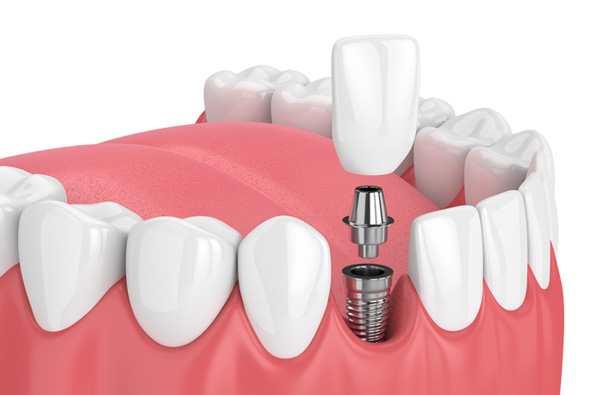 Dental implants help to replace missing tooth roots. These tools are posts that resemble screws, which will act as the roots of your teeth. The process of the implant surgery often depends on your jawbone and the type of implant that you choose. These dental tools are preferred as they offer solid support to your artificial teeth and ensure you have adequate dental health. You are free to visit our clinic at Stephen L Ruchlin DDS for professional installation.
Dental implants help to replace missing tooth roots. These tools are posts that resemble screws, which will act as the roots of your teeth. The process of the implant surgery often depends on your jawbone and the type of implant that you choose. These dental tools are preferred as they offer solid support to your artificial teeth and ensure you have adequate dental health. You are free to visit our clinic at Stephen L Ruchlin DDS for professional installation. What Are Dental Implants?
Dental implants are sophisticated prosthetic structures surgically implanted into the jawbone by our dental professional. This transformative procedure becomes necessary when you experience tooth loss, providing a durable and aesthetic solution for the restoration of one or more missing teeth. A dental implant is like a replacement for a missing tooth. Our dentist uses a screw-like piece to put the implant into the jawbone, and it works as a support for a fake tooth, which we call a crown. There is also a part called an abutment that connects the fake tooth to the dental implant.
What Is the Procedure for Dental Implants?
Getting dental implants takes a few steps and can take about 3 to 9 months. You might see different dental specialists, like a gum expert (periodontist) and an oral surgeon, along the way before everything is finished. There are several steps in the installation process, and they include:
Initial Evaluation
First, we will check your teeth, gums, and jawbone to see if they are okay. A crucial part of this check is figuring out if your jawbone is strong enough for the implant. If your jawbone is not strong enough, we might recommend a bone grafting procedure or a different type of restoration. Also, your gums need to be healthy and not have any gum disease.
Placement of Dental Implant
During the dental implant procedure, our oral surgeon will carefully cut your gum to reveal the jawbone underneath. Then, they will make a hole deep into the bone to insert the implant post. If you want, we can put a temporary, removable denture over the hole to make it look nice until the real tooth is ready to be attached to the implant.
Osseointegration
Once the dental implant is in, it takes about two to six months for new bone to grow around the screw. This process is called osseointegration, which means it is combined with the bone. While this happens, the natural jawbone gets stronger and wraps around the dental implant, keeping it steady like a real tooth root.
Placement of Abutment
Usually, we add a metal extender referred to as an abutment to the implant. This can be done either in the first procedure or in a second small procedure where we use local anesthesia. Abutments are like connectors that link the replacement tooth to the implant. If we add the abutment in a second procedure, we might need to cut a little through the gum that may have covered the implant. This is because we put a healing cap on the implant after placing it. While the cap protects the implant, it usually stops tissue from growing over it.
Placing the Artificial Tooth
Once you are all healed up, we will make a mold of your teeth. This helps create your permanent replacement tooth or teeth, which can either be fixed or removable. If you go for a removable tooth, it gets put on a metal frame and connected to the abutment. You can take this type of tooth off at home for cleaning every day. If you choose a fixed tooth, it will be firmly attached to the abutment either by cement or screws, and it stays in place all the time.

How Long Does a Dental Implant Procedure Take?
Our dentist will insert an implant into your jawbone and ensure it sits securely. This surgery can take an average of 1-2 hours. After this, we wait about 3 months before finishing the final steps to replace the missing tooth.
What Are Dental Implants Made Of?
Many dental implant tools are crafted from materials such as zirconium oxide or titanium. Occasionally, other materials such as titanium alloys, gold alloys, ceramics, or cobalt-based alloys might also be used. Plenty of research supports the safety of these materials.
How Long Do Dental Implants Last?
Essentially, a dental implant is meant to stay in your mouth for a long time. Research shows a success rate of 90 to 95 percent over 10 years. However, there is a slight chance that a dental implant might not work well in the months or years after it is put in.
Who Is a Good Candidate for Dental Implants?
Ideal candidates for dental implants generally should have good oral health and are at an age where their jawbone has finished growing. Additionally, having sufficient bone to support and anchor the implants is crucial. It is worth noting that even if there is some bone loss in the jaw, you could still be considered a suitable candidate for implants. In such a case, you will need to undergo bone grafting.
Can You Get Dental Implants After Bone Loss?
Typically, good health, healthy gums, and sufficient jaw bone are prerequisites for a dental implant. If your jaw lacks enough bone, there is a solution. Bone grafting is a method that establishes a solid foundation, getting things ready for a dental implant. It proves effective for thin bone, substantial damage, or if the bone is weakened and decayed, making it unsuitable to support a dental implant.
What Is a Bone Graft for Dental Implants?
A dental bone graft enhances the volume and density of your jaw bone in places where bone loss has happened. The material for the bone graft can either come from your own body (autogenous), be bought from a human tissue bank (allograft), or be sourced from an animal tissue bank (xenograft).
Can You Get Dental Implants With Gum Disease?
Fortunately, if you are contemplating implants, you are still eligible for the procedure even if you have periodontal disease, as long as the disease is effectively being treated. However, it might be necessary to postpone the placement of dental implants until the periodontal disease is well-managed.
Schedule An Appointment
Dental implants are effective solutions for your missing teeth and offer amazing results. If you are considering these solutions, visit us at Stephen L Ruchlin DDS for more information and feel free to call us at (585) 427-7820.




